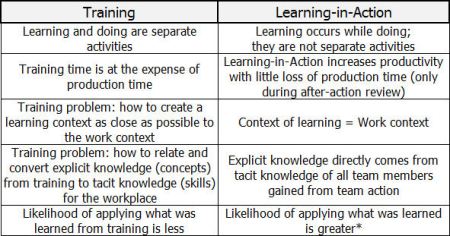In a previous blog, I pointed out (see: “F9- Economics of (Unconscious) Learning”) that much of our knowledge came from working/doing than from schooling/training. We learn much more from working/doing, but this learning is often largely unconscious. The antidote is “learning-in-action” where a team, after performing an action or project, sits down to reflect and document what they learned, what worked and what did not work, what success and failure factors they experienced, what insights they gained, etc. This process has many names: after-action review, post-mortem, lessons-learned session, etc. Its objective is simple: before team members disband and forget what they learned, the knowledge gained from doing is captured in a document and thereby made available to future teams who will perform the same or similar activity or project. If the document is web-based and placed in a searchable knowledge repository, then the re-use of knowledge is better facilitated. Two good examples are the US Army’s Center for Army Lessons Learned and Xerox’s Eureka system.
This means that learning can take place without leaving the workplace!
The usual HRD mental model of training is that learning time is at the expense of production time. That is why many corporations adopt an upper limit to number of training days per year (usually two weeks for every worker). Learning (knowledge acquisition) and working (knowledge application) are assumed to be two different activities occurring at different times and different contexts. They are, in other words, usually viewed as either/or activities instead of both/and activities.
Here are more distinctions between training and learning-in-action:

*In their book “The Knowing-Doing Gap: How Smart Companies Turn Knowledge into Action” authors Jeffrey Pfeffer and Robert I. Sutton of Stanford University concluded from their four-year research that “…one of the most important insights from our research is that knowledge that is actually implemented is much more likely to be acquired from learning by doing than from learning by reading, listening, or even thinking.”



